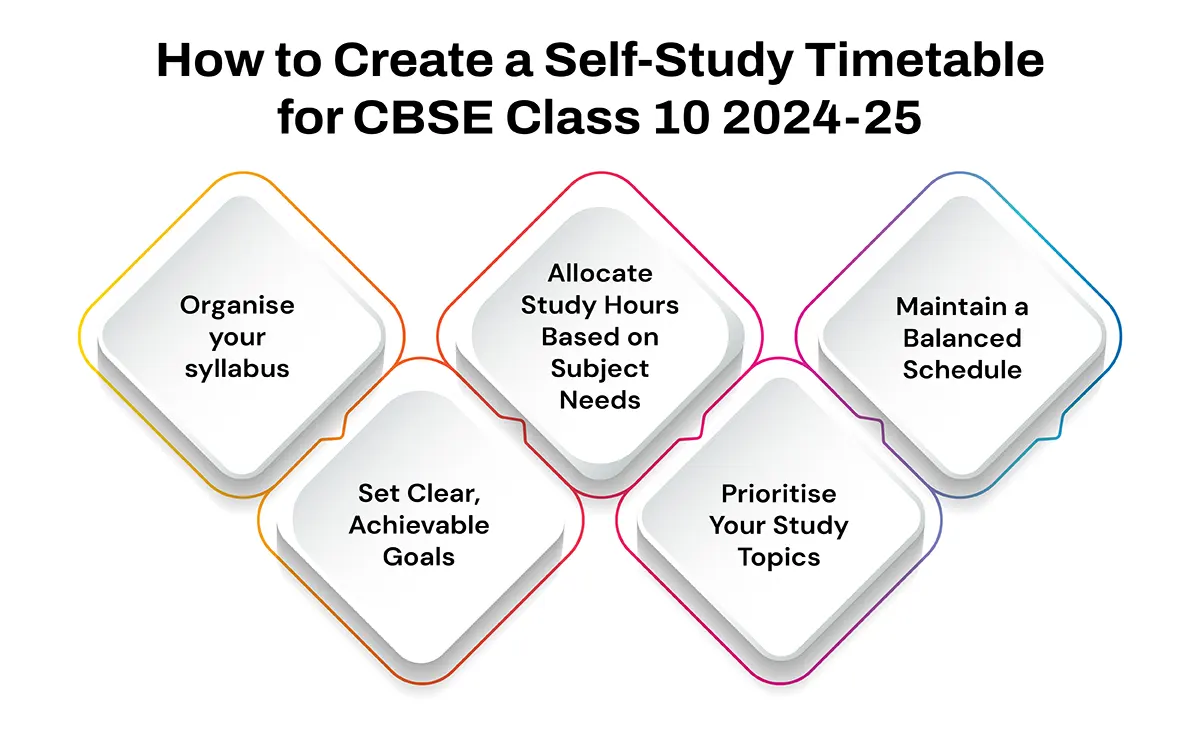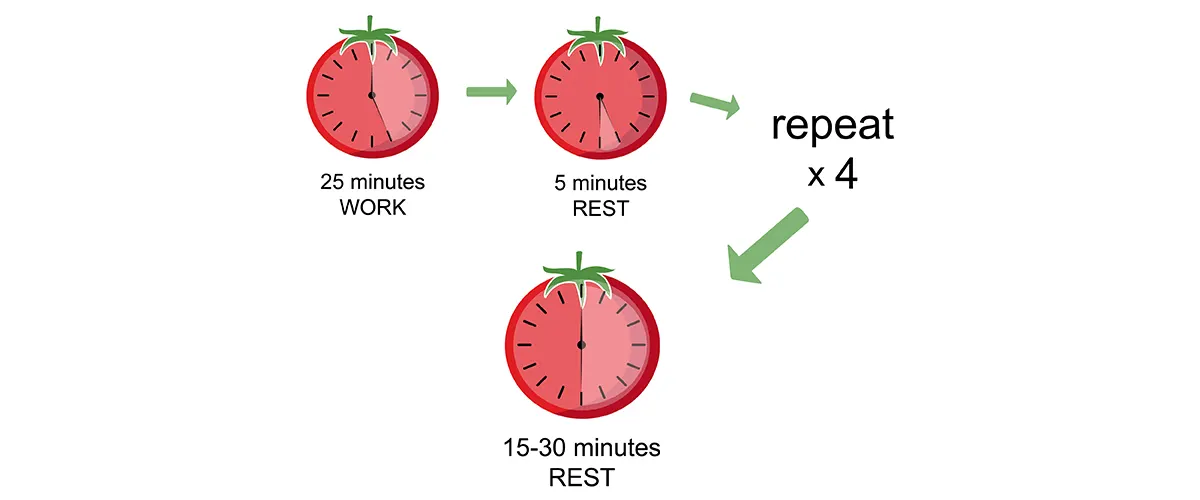Facing the CBSE class 10 board exams can be one of the most stressful times for students. You might be juggling school assignments, coaching classes, and personal commitments, all while trying to stay on top of your studies. In moments like these, the question arises: how do you make time for everything without burning out?
This is where a self-study timetable for class 10 becomes a game-changer. It serves as a structured plan that helps you allocate your study hours effectively, prioritise topics based on importance, and keep track of your progress—all without feeling lost in the chaos of preparation.
In this blog, we’ll guide you through creating a customised study timetable, show examples of a balanced daily timetable for class 10 students and suggest ways to help you excel in your exams.
- ▪ How to Create a Self-Study Timetable for CBSE Class 10 2024-25
- ▪ Daily Self-Study Timetable for Class 10 Students
- ▪ Subject-Wise Study Plan
- ▪ Weekly Revision and Mock Test Strategy
- ▪ Tips for Effective Self-Study for Class 10 Students
- ▪ Additional Resources for CBSE Class 10 Students
- ▪ Conclusion
- ▪ FAQs
How to Create a Self-Study Timetable for CBSE Class 10 2024-25

Creating the best timetable for class 10 involves several important steps:
1. Organise your syllabus
First, you need to organise all your content to understand how to begin preparing for your exams. Make a list of your subjects and find the updated syllabus for each. The latest syllabus for all class 10 papers is available on the Oswal Publishers website. After doing that, find your study notes for each subject and chapter.
2. Set Clear, Achievable Goals
When starting with preparation, it is essential to take small steps. Give yourself small and achievable goals according to your capability. This helps you build a strong foundation brick-by-brick. Increase the level of pressure slowly so that you do not get overwhelmed.
3. Allocate Study Hours Based on Subject Needs
Every student has their strengths and weaknesses. Allocate more time to challenging subjects and balance them with lighter subjects. For example, spend two hours daily on maths if it is your weak point, while English might require just an hour.
4. Prioritise Your Study Topics
Not all chapters are created equal. Some carry more weight in exams than others. Prioritise studying the topics that have been important in the previous board exams. Reviewing previous years’ question papers can help identify high-priority chapters.
5. Maintain a Balanced Schedule
Studying for long stretches without breaks can lead to fatigue and reduced retention. When designing your daily timetable for class 10 students, include short 5-10 minute breaks every hour to refresh your mind. Include hobbies or light exercise to keep stress levels in check.
Daily Self-Study Timetable for Class 10 Students
Creating a balanced daily schedule can help you maintain focus, stay productive, and manage stress effectively. Wondering how to make a study timetable for class 10? Below is a detailed example of a daily timetable for class 10 students to help you out:
| Time | Activity |
| 5:30 – 6:00 am | Morning exercise or meditation to energise your day |
| 6:00 – 7:30 am | Practice math problems and numerical questions |
| 7:30 – 8:00 am | Breakfast |
| 8:00 – 9:30 am | Start a new chapter, memorise key formulas, take notes, and mark important dates |
| 9:30 – 10:00 am | Short break |
| 10:00 – 12:00 pm | Revise another subject and practice its questions |
| 12:00 – 1:00 pm | Lunch |
| 1:00 – 3:00 pm | Focus on English/Hindi grammar orliterature |
| 3:00 – 3:30 pm | Short break |
| 3:30 – 5:00 pm | Solve sample papers and previous year’s questions |
| 5:00 – 6:00 pm | Rest or engage in a recreational activity |
| 6:00 – 8:00 pm | Review the day’s notes or work on homework |
| 8:00 – 9:00 pm | Dinner |
| 9:00 – 10:00 pm | Rest and go off to sleep |
Subject-Wise Study Plan
Maths
Maths can feel like a double-edged sword—it is either your favourite subject or the one that keeps you up at night. The key to mastering maths lies in consistent practice and a solid grasp of concepts. Here is how to make maths your strongest suit:
- Focus on understanding the basics: Whether it is algebra, trigonometry, or geometry, make sure you truly understand the foundational concepts before attempting complex problems. Without this, you will just be memorising formulas that may not stick.
- Daily problem-solving practice: Dedicate at least an hour daily to solving a variety of questions. Start with simpler problems and gradually work your way up to more difficult ones.
- Keep a formula sheet: Create a cheat sheet of important formulas and revise them every day. Trust me, this simple step saves you tons of stress during last-minute revisions.
- Use sample papers: To simulate the actual exam, regularly practise with sample papers. This helps you get comfortable with the format and identify the types of questions that frequently come up.
Science
Science in class 10 forms your base for future competitive exams like JEE and NEET. Hence, clearing your basics of this subject is crucial. Physics, chemistry, and biology each need its strategy:
- Physics: Focus on understanding the laws and principles behind each concept. Practise numerical, diagrams, especially circuit diagrams and ray diagrams, as these often appear in exams.
- Chemistry: This is a mix of theory and application. For theory, memorise key reactions and mechanisms. For numerical problems, like balancing chemical equations and mole concept calculations, daily practice is essential.
- Biology: It is all about retention and recall. Make short notes of important definitions, processes, and labelled diagrams. For processes like photosynthesis or digestion, draw flowcharts to simplify revision.
Social Science
Social Science might seem like a lot to remember, with history dates, political proceedings, and geographic terms all rooting for your attention. But with the right strategy, you can master it:
- History: Try to understand the story behind events rather than just memorising dates. Create timelines for key periods to help with chronological order, and use mnemonic devices for remembering sequences.
- Geography: Focus on map practice. Questions about locations and regions are common, and they are easy to score if you are prepared.
- Political science (civics): Here, understanding the structure and function of government bodies is crucial. Do not just read—discuss concepts with friends or family to make them stick.
- Economics: Make sure you understand basic concepts and definitions, like GDP and consumer rights. For tricky topics, watch videos that simplify economic concepts through real-world examples.
English
English often gets overlooked because students assume it is “easy” compared to other subjects. But it is a subject that can make or break your CGPA.
- Literature: Read all your chapters thoroughly and understand the main themes and characters. For poetry, make sure you can identify the poet’s message and any literary devices used. This makes answering reference-to-context questions easier.
- Grammar and writing: Do not take grammar for granted. Practise tenses, active-passive voice, and direct-indirect speech regularly. For writing sections like letters and essays, memorise standard formats and structures, as these earn you points.
- Reading comprehension: Practice with unseen passages. Time yourself to ensure you can quickly find answers and understand the passage’s tone and main idea.
Hindi
Hindi often falls into the “last-minute preparation” category, but with a little attention, you can score impressively in this subject:
- Grammar and vocabulary: Just like in English, good grammar is essential. Practise sandhi-viched, and alankar, and do regular vocabulary exercises and spelling practises.
- Prose and poetry: Make sure to read all your chapters and poems multiple times. Try to understand the themes, character motivations, and the poet’s or author’s background. This helps with both short and long-answer questions.
Weekly Revision and Mock Test Strategy
Weekly mock tests, regular revisions, and practising with previous year’s question papers are key steps to mastering your preparation for class 10 exams. Here is why these strategies are so important:
- Weekly mock tests: Taking a mock test every week helps you get comfortable with the actual exam format and timing. It is like having a practice match before the big game – the more you do it, the less nervous you will feel on the real exam day.
- Regular revisions: Revising regularly makes sure that what you studied stays fresh in your memory. Instead of cramming at the last minute, spend a little time each week reviewing your notes and key points. It is a great way to keep everything clear in your head.
- Practising with previous year’s papers: Solving past question papers gives you an idea of the type of questions that could come up in the exam. Plus, you’ll get to know which topics are most important and need extra attention. It’s like peeking into the examiners’ minds!
Try Oswal.io for free online mock tests that match the latest CBSE pattern. With detailed performance analysis, you can understand where you stand and what to work on. It is available anytime and anywhere, making it an easy and effective way to stay on track.
Check Out: CBSE Subject Codes for Class 10
Tips for Effective Self-Study for Class 10 Students
1. Organise Your Study Material

Keep all your notes, textbooks, and study aids in one place. Disorganisation can waste valuable time and add unnecessary stress.
2. Make Use of Study Tools

Flashcards, educational apps, and highlighters can be extremely helpful. For instance, use flashcards to memorise key terms and formulas. Some apps can set reminders for study breaks and help manage your study routine for class 10 effectively.
3. Follow the Pomodoro Technique

This technique involves studying for 25 minutes, followed by a 5-minute break. It is a great way to stay productive and maintain focus over long study sessions.
4. Stay Active and Healthy

Regular physical activity and a balanced diet support cognitive function. Remember, a healthy mind resides in a healthy body.
Additional Resources for CBSE Class 10 Students
To truly excel in your class 10 board exams, it is essential to have the right study materials at your fingertips. While a self-study timetable for class 10 sets the foundation, supplementary resources play a crucial role in reinforcing your learning and practice.
Class 10 Sample Papers
Practising with class 10 sample papers allows you to simulate exam conditions, helping you to understand time management and the structure of the exam. These papers often come with model answers, enabling you to gauge the depth and detail required for high-scoring responses.
Solved Papers
Ever wonder how a perfect answer should look? Solved papers are invaluable for this purpose. They show the exact format, structure, and points needed for scoring top marks. Going through these helps you to craft precise answers that examiners expect.
Checkout:
Question Banks
For thorough practice, question banks are your go-to resource. They contain an array of questions, from basic to challenging, that cover every corner of the syllabus. Working through these banks familiarises you with various question types, so nothing feels unfamiliar on the big day.
Checkout:
All-in-one Study Guides
If you prefer an all-encompassing resource that tackles every subject, then all-in-one study guides are the way to go. These books are especially useful when you want to consolidate your learning without switching between multiple textbooks.
Checkout:
Worksheets and Textbooks
Worksheets help cement your learning through practice. They are particularly helpful for topics that require repetition, such as Maths problems or grammar exercises in English. Textbooks remain the backbone of your studies, offering detailed explanations and examples that build foundational knowledge.
Checkout:
Check out Oswal Publishers’ range of resources, including sample papers, question banks, and solved papers, tailored to boost your preparation.
Conclusion
Creating and adhering to a well-structured self-study timetable for class 10 can transform your exam preparation journey. By following a clear plan, you can study smarter, stay organised, and keep stress to a minimum. Whether it’s incorporating regular revisions, mock tests, or using the right study tools, every effort counts. Stay consistent, stay focused, and trust in yourself.
FAQs
Q1. How many hours should I study daily for the class 10 board exams?
Ans – It varies per student, but 5-6 hours of focused study each day is effective for most.
Q2. What should I do if I fall behind my study schedule?
Ans – Adjust your timetable to catch up gradually and do not stress—prioritise the most important topics first.
Q3. Can practising with sample papers improve my scores?
Ans – Absolutely. Sample papers help familiarise you with exam patterns and improve time management.
Q4. Where can I find reliable sample papers for class 10?
Ans – You can access sample papers, solved papers, and mock tests from Oswal Publishers and platforms like Oswal.io.






